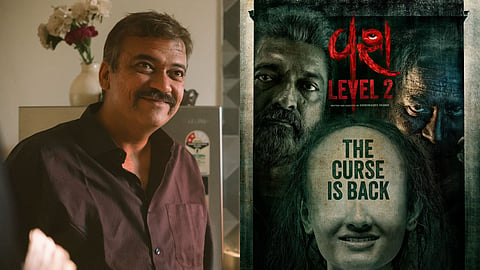

When Ajay Devgn’s supernatural-horror thriller, Shaitaan, came out last year, the Hindi film industry was in search of the next big spectacle. Action and horror were believed to be the crowd-pullers in the changed dynamics of a post-pandemic world. The effect of such a belief was visible in Shaitaan, which employed loud, shock-value scenes to create terror rather than rhythmically creating tension through the atmosphere. The method seemed to work well for the film as it gained numbers at the box office. In fact, it was the success of Shaitaan that then pushed the makers of the original Gujarati film, Vash (2023), to think of a sequel. “If Shaitaan hadn’t done well, I wouldn’t have thought of making Vash Level 2,” says director Krishnadev Yagnik.
The filmmaker, who had already made two other films since the release of Vash, was initially struggling to think of ideas for the sequel. The original film revolves around a family and a girl in the family who gets under the black magic spell of an enigmatic stranger. Krishnadev was considering telling a similar story of another family in the sequel, but he was not able to make up his mind for the longest time. Six months later, as he was driving back to his office after meeting with the producer, an idea began to take shape. “What if 200 girls get possessed this time? I thought that it would increase the stakes, and I will merge it with the original story in some way. That was the initial seed after which I started writing the screenplay,” explains Krishnadev. The director also admits feeling some pressure to deliver for the second part and wanted to take his time to write and execute the film. “If the sequel came out unintentionally funny, then it would have been wrong. So, I wanted to be careful in writing and I even shot the film for over 52 days to avoid any tonal inconsistencies,” he says.
The conscious involvement of the writer-director is felt in Vash Level 2 as it begins unlike any horror story. The film spends some time building the atmosphere before terror strikes, as we see the routine life of teenagers going to school, arguing with their parents, and sitting indifferently in the classroom. It’s only later that some of them start getting possessed and create havoc in broad daylight. Krishnadev says that he wanted to play around with expectations of the audience, who are coming to watch a sequel, knowing that it is a story where a character will get possessed at some point. “If it were not a sequel, I would have given some hook at the start by either showing the villain or introducing the conflict. As it was the second part, I thought of showing it as a linear story of the daily life of the girls. I didn’t want to use any background music for the entire sequence as well, so as to build the anticipation,” says the filmmaker.
His rigor for staying true to the beats of the narrative was visible even in the climax of Vash, where things don’t find a simple resolve but take a sinister, far more violent turn as compared to Ajay’s Shaitaan, which chooses to go for a milder, happy ending. Krishnadev says that the makers of Shaitaan had narrated the alternative ending to him and asked for his opinion. “I told them it would be better not to keep a happy ending,” he says. However, after Shaitaan was released and became a success, the director felt that audiences were accepting the ‘happy ending’ more. “I realised that I was wrong in objecting to the end and they (Shaitaan makers) were right as they had more experience and a better vision compared to me,” says Krishnadev. On whether he would change the ending of Vash if given a chance, the director is quick to say no. “If a producer asks me to do it for commercial reasons, I would rather leave the film. I would never change anything or add songs to make a film commercially viable,” he says.
It is perhaps a testament to his honesty that Vash won the National Award for Best Gujarati Feature Film, along with actor Janki Bodiwala bagging the honour for Best Actress in a Supporting Role. This coincidentally happened just weeks before the theatrical release of Vash Level 2 on August 27. Krishnadev had no idea that the National Awards were going to be announced on the evening of August 1, on the same day the trailer of the sequel was unveiled by the makers. The director also didn’t expect the film to win the honour. “I had my doubts as Vash talks about superstition, and usually the National Award is given to films that are based on socially relevant stories. But I was overjoyed when the film won. It was surreal,” says the filmmaker, who was known for making lighter, romantic comedies like Chhello Divas (2015), Karsandas Pay and Use (2017), and Naadi Dosh (2022) before he ventured into horror with Vash. He says that the process of writing doesn’t change significantly while shifting through genres. “I just think of making the audience laugh, cry, or experience fear. I don’t want to write a single scene in my story where the audience is just sitting without any reaction,” he concludes.